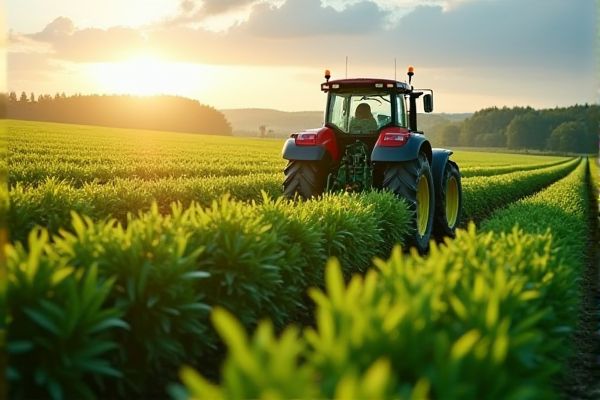
AI plays a pivotal role in enhancing crop management through precise data analysis and predictive modeling. Machine learning algorithms can assess weather patterns, soil conditions, and crop health, allowing farmers to make informed decisions and optimize resource use. Drone technology equipped with AI provides real-time monitoring of fields, enabling early detection of pests and diseases. Automation of irrigation and nutrient delivery systems, guided by AI insights, maximizes yield while minimizing waste.
AI usage in crop management
Precision Agriculture
AI usage in crop management can enhance yield predictions and optimize resource allocation. For example, Precision Agriculture employs AI algorithms to analyze soil moisture and nutrient levels, allowing for targeted interventions. The potential for increased efficiency in water usage could lead to cost savings for farmers. This technology may also aid in pest and disease detection, reducing losses and improving overall crop health.
Yield Prediction
AI technologies have the potential to significantly enhance crop management and yield prediction. By analyzing vast datasets, such as weather patterns and soil conditions, AI can provide more accurate forecasts for agricultural output. For example, institutions like the International Rice Research Institute utilize AI to improve rice yield assessments. This capability may lead to more efficient resource allocation and better food security in the future.
Pest and Disease Detection
AI applications in crop management can enhance pest and disease detection, leading to improved yields. For instance, machine learning algorithms analyze images from drones or sensors to identify signs of infestation or disease early. This proactive approach allows farmers to apply targeted treatments, reducing chemical use and costs. Enhanced decision-making can contribute to sustainable agricultural practices, benefiting both crops and the environment.
Soil Health Monitoring
AI in crop management can enhance decision-making by analyzing data for optimal planting times and resource allocation. For instance, using AI algorithms to monitor soil health can predict nutrient needs based on crop type and growth stage. This technology may lead to improved yield and reduced waste, benefiting farmers economically. The potential for more sustainable practices is evident, as precise data usage can minimize over-fertilization and water usage.
Weather Forecast Integration
AI can enhance crop management by analyzing data on soil conditions, crop health, and weather forecasts. For instance, integrating weather data from institutions like the National Weather Service can help optimize irrigation schedules. This approach increases the likelihood of improving yields and reducing water waste. Farmers may benefit significantly from adopting such technology to make informed decisions.
Irrigation Optimization
AI plays a crucial role in crop management by analyzing data to enhance agricultural productivity. For instance, machine learning algorithms can optimize irrigation schedules based on real-time weather and soil moisture data. This technology allows farmers to reduce water usage while maximizing crop yields. Implementing AI-driven precision agriculture systems can lead to significant cost savings and improved resource management.
Crop Rotation Planning
AI can optimize crop management through data analysis, improving yield predictions and resource allocation. For instance, in crop rotation planning, algorithms can analyze soil health and past crop performance to suggest the most beneficial rotation strategies. This data-driven approach increases the likelihood of sustainable farming practices while enhancing productivity. Farmers who adopt AI tools may benefit from better decision-making processes, leading to increased profitability.
Resource Utilization Efficiency
AI usage in crop management can significantly improve resource utilization efficiency. By analyzing data from various sources, such as soil sensors and weather forecasts, farmers can optimize water and fertilizer application. This targeted approach can reduce waste and enhance crop yields, making farming more sustainable. For example, precision agriculture techniques employed by institutions like the University of Nebraska can demonstrate the potential benefits of AI in optimizing resource use.
Remote Sensing and Satellite Imagery
AI can significantly enhance crop management by analyzing remote sensing data to optimize planting and harvesting schedules. Satellite imagery provides valuable insights into crop health, soil conditions, and environmental factors, which can aid farmers in making informed decisions. The possibility of reducing costs and increasing yields becomes more tangible with AI-driven analytics. Applications like precision agriculture can further illustrate these advantages, allowing for tailored resource allocation based on real-time data.
Automated Harvesting Systems
AI usage in crop management can optimize yield by analyzing soil conditions and predicting weather patterns. Automated harvesting systems, such as robotics, increase efficiency and reduce labor costs. These technologies enable farmers to allocate resources more effectively, thus enhancing sustainability practices. The integration of AI with precision agriculture tools presents a significant opportunity for improved crop productivity.
 techknowy.com
techknowy.com